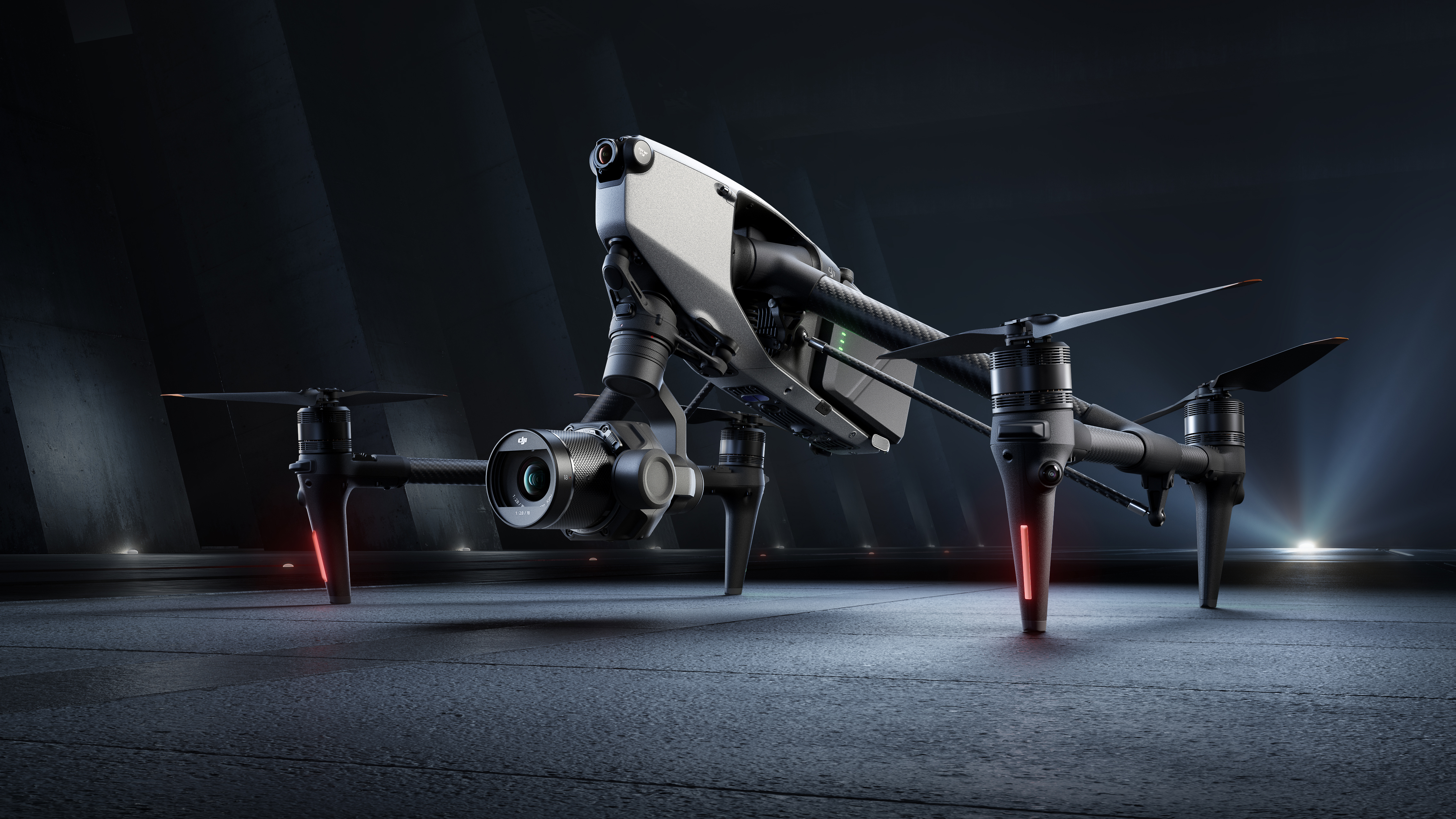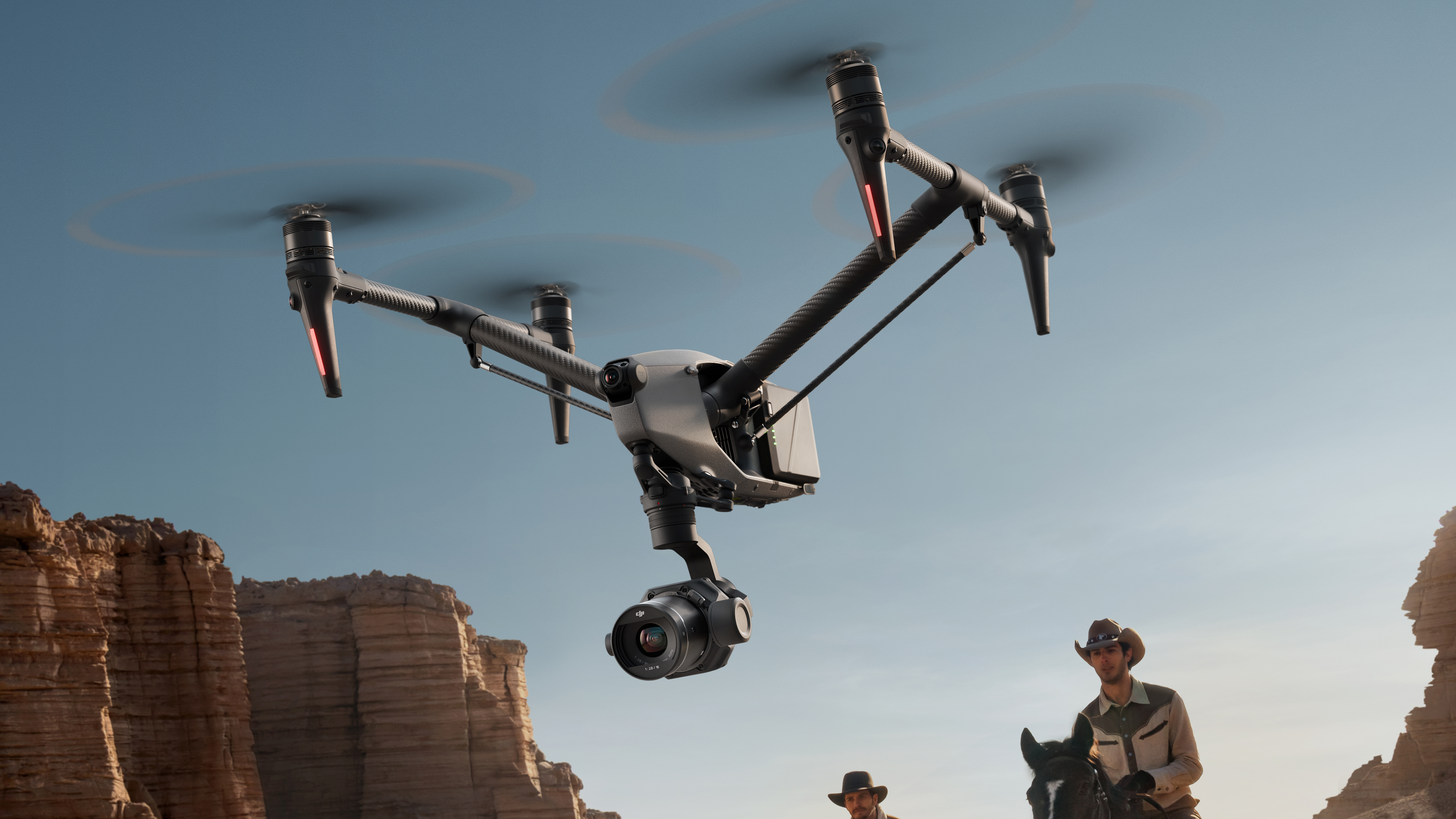DJI has taken the wraps of the most powerful cinema drone it's ever made – and the DJI Inspire 3 comes with a price tag to match its slightly terrifying looks.
The successor to the pro-level DJI Inspire 2, which arrived way back in 2016, is a big upgrade over that drone in every way, and it looks distinctly like DJI's answer to the Sony Airpeak – another Hollywood-level flying camera with a sky-high price tag.
On the front of the Inspire 3 is a gimbal-stabilized, full-frame 8K camera called the Zenmuse X9-8K. This makes it a future-proofed aerial rig that's more than good enough for shooting film and TV productions.
The drone can shoot both 8K/25fps CinemaDNG video and 8K/75fps Apple ProRes RAW video, making its footage ideal for color-grading in the edit suite, while for slow-mo shots it can, impressively, shoot full-frame 4K/120fps ProRes RAW video without cropping.
Because it has DJI's DL mount, the Inspire 3's camera is also compatible with a range of lenses. There are full-frame 24mm, 35mm, and 50mm options, plus more exotic ones like an 18mm f/2.8 full-frame ultra-wide. DJI says it's also made a new telephoto lens that's been custom-made for 8K aerial cinematography, though there's no release date for this yet.

That's the camera setup, but what about the flying experience? Despite its size and complexity, the Inspire 3 can apparently be flown by single pilots thanks to some new intelligent flight modes. A new Spotlight Pro feature claims to offer powerful single-object recognition and tracking, letting you focus more on avoiding expensive crashes than framing your shot.
The Inspire 3 also has what DJI calls its "most-advanced omnidirectional sensing system to date", which is powered by nine visual sensors, plus an FPV (first-person view) lens with a night-vision sensor, which serves up a clear 1080/60p feed to pilots in low-light or night shoots.
Another first is the new O3 Pro Transmission, which is a big step up from the current OcuSync 3.0. This apparently lets you fly the drone from up to 15km away (within your region's drone rules, of course) or up to 12km in dual-controller mode.
Naturally, you'll need a pretty good controller to fly a drone this advanced, so the Inspire 3 comes with the current top-end DJI RC Plus, which has a 7-inch 1,200-nit high-brightness screen. And the Inspire 3 is packed with other pro-level features, including 1TB of storage and new dual batteries that promise a flight time of up to 28 minutes.
And that price tag? A cool $16,499 / £13,419 / AU$20,469 for the Inspire 3 drone, plus an extra $1,299 / £1,209 / AU$1,749 if you want that new DL 18 mm f/2.8 ASPH lens.
Analysis: a new rival for the Sony Airpeak

Clearly, the DJI Inspire 3 is an incredible cinema drone that's packed with the kind of tech that will hopefully filter down to some of the best drones that most of us can actually afford to buy.
But while we wait for its O3 Pro Transmission and 8K video powers to arrive in more affordable flying cameras, we can watch the DJI Inspire 3 fight it out with the Sony Airpeak S1.
Sony's cinema drone made a surprise landing back in 2021, and was designed to fly on some of the same professional film sets that DJI had managed to force its way into.
Naturally, the Airpeak is designed to whisk Sony's own full-frame Alpha cameras over high-budget film sets, which means you can buy it for $8,999 (or around £6,350 / AU$11,620) without a gimbal or camera.
But whichever cinema drone film producers go for, they certainly now have some very capable flying cameras for those dramatic aerial shots, from both DJI and Sony.
from TechRadar - All the latest technology news https://ift.tt/Gb9M5ei